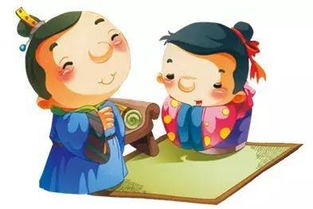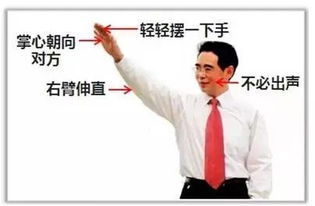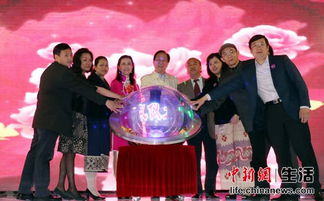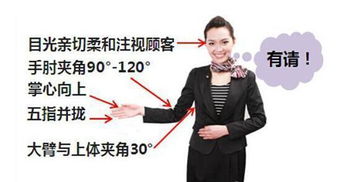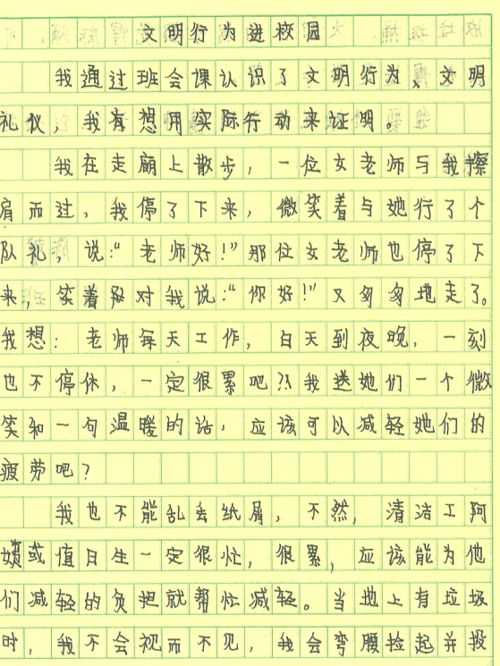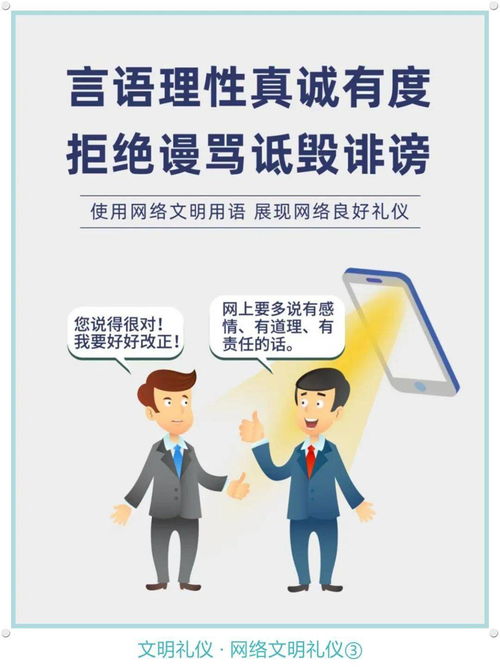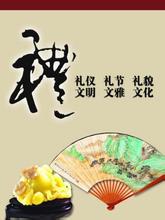1.中国餐桌礼仪英文10条
1. On arrival one should first introduce oneself, or let the master of the banquet do the introduction if unknown to others, and then take a seat in accordance with the master of the banquet's arrangement.到达时,应当先介绍自己,或者让宴会主人介绍你,然后按照宴会主人的安排就座。
2. Let older people eat first, or if you hear an elder say "let's eat", you can start to eat. You should not steal a march on the elders.让老人先吃,或者如果你听到老人说“我们吃吧”,你才可以开始吃了。你不应该对老年人抢先一步。
3. If the guest of honor or most senior member is not seated, other people are not allowed to be seated. If he hasn't eaten, others should not begin to eat.如果贵宾或大多数主要成员没有就座,其他人就不能就座。如果他没吃东西,别人就不应该开始吃。
4. When finding your favorite dish, you should not gobble it up as quickly as possible or put the plate in front of yourself and proceed to eat like a horse.当你发现你最喜欢的菜肴时,你不应该快快地狼吞虎咽,或者把盘子放在自己面前,然后像马一样吃下去。5. You should consider others at the table. If there is not much left on a plate and you want to finish it, you should consult others. If they say they don't want any more, then you can eat proceed.你应该考虑餐桌上的其他人。
如果盘子里没有剩下多少东西时,你想吃了它,你应该咨询其他人。如果他们说他们不想再吃了,你可以继续吃。
6. Concentrate on the meal and your companions. Watching television, using your phone, or carrying on some other activity while having a meal is considered a bad habit.集中精神在吃饭和你的同伴身上。边吃饭边看电视、打电话或进行其他活动被认为是坏习惯。
7. You should try to refill your bowl with rice yourself and take the initiative to fill the bowls of elders with rice and food from the dishes. If elders fill your bowl or add food to your bowl, you should express your thanks.你应该试着自己给碗里装满米饭,主动给老人的碗里装满米饭和盘子里的食物。如果长辈们把碗装满或给你的碗里加了食物,你应该表达你的谢意。
8. When someone pours tea into your cup, you can tap the table with your first two fingers two or three times, showing thanks to the pourer for the service and of being enough tea. The pourer will stop pouring when seeing the gesture.当有人把茶倒进你的杯子时,你可以用头两三个手指轻敲桌子,以表示感谢倒茶人的服务以及茶的充足。当看到那个手势时,倾倒者会停止倾倒。
9. It is not good manners to pick up too much food at a time. You should behave elegantly. When taking food, don't nudge or push against your neighbor. Don't let the food splash or let soup or sauce drip onto the table.一次吃太多东西是不礼貌的。你应该举止优雅。
吃东西时,不要推或推你的邻居。不要让食物飞溅或让汤或酱汁滴到桌子上。
10. When eating, you should close your mouth to chew food well before you swallow it, which is not only a requirement of etiquette, but also better for digestion. You should by no means open your mouth wide, fill it with large pieces of food and eat up greedily.吃东西时,在吞下食物之前要先闭上嘴咀嚼,这不仅是礼仪的要求,而且对消化也有好处。千万不要张大嘴巴,嘴里塞满大块食物,贪婪地吃下去。
2.关于餐桌礼仪的英语作文带翻译
Chinese table manners
These are mostly concerned with the use of chopsticks.Otherwise generally Chinese table manners are rather more informal,what would be considered rude in other cultures such as talking with the mouth full may be acceptable but better not to do so.
* Chopsticks must always be held in the correct manner.It should be held between the thumb and fingers of the right hand,
* Chopsticks are traditionally held in the right hand only,even by the left-handed.Although chopsticks may now be found in either hand,a few still consider left-handed chopstick use improper etiquette.One explanation for the treatment of such usage as improper is that this can symbolise argument,as the chopsticks may collide between the left-handed and right-handed user.
3.中国餐桌礼仪英语10句简单
1.让客人和长辈先吃每一道菜 let the elder people and the customer eat first2.不要用筷子敲碗 don't use the chopsticks hit the bowl3.不要将手伸到饭桌对面夹菜 don't reach to get the food on the opposite side4.等大家到齐了,才开始吃 don't eat until everyone is there5.为主人的长寿、健康、成功干杯 wish for the people who host the dinner 久仰,久仰!I have long been looking forward to meeting you.I have long desired to meet you.久违了。
I haven't seen you for ages/for a long time.It's been such a long time since we met last time.久闻大名。I've heard a lot about you.这次由我负责全程陪同你们。
I will be with you for the entire visit/trip. 欢迎你到中国来。一路上辛苦了! / 一路上还好吧?Welcome to China.I hope you've had a good flight. 或I hope you enjoyed your flight. / How was your journey?谢谢你专程来接我。
Thank you very much for coming all the way to meet me.您贵姓?/您怎么称呼?May I know your name,please?很高兴见到你。您怎么称呼7 Glad/Pleased to meet you,Misterr…?(可以用拖长问话的办法来询问对方的姓名) 中国有句古话说:“有朋自远方来不亦乐乎?” There's an old saying in Chinese which goes: “Isn't it a great pleasure/joy to have friends coming from afar?As a Chinese saying goes, “Nothing is more delightful than meeting friends from far away.” 这是给您准备的日程安排.我们简单过一遍吧。
如果你有什么特殊要求.也可以告诉我。This is the tentative itinerary/schedule I have prepared for you.Let's go through it together.If there is any special request,just let me know. 如果有什么需要帮忙的.尽管说。
If you need anything,don't hesitate to ask. Just let me know if you need anything.我们安排你住在城里的……酒店.离我们公司开车要走40分钟。We've arranged for you to stay in…Hotel,which is in the downtown area,about 40- minute drive from our company. 我们也有宾馆,不过条件不如酒店。
离单位倒是很近.走路就可以到。We have our own guest house,but there is no comparison between the two, only the guest house is within walking distance of the workplace. 除了正式会谈以外.我们也为大家安排了一些游览活动。
In addition to official meetings,we have also arranged some sightseeing. 我期待着您的再次来访。I'm looking forward to your visit again. 代我向……问好。
Remember me to… / Say hello to…for me. 不用谢,这是我们应该做的。Don't mention it. It's my pleasure.欢迎再来!Do come again.。
4.英语餐桌礼仪的5个句子加翻译
Situation 1:You are at a school party. Your friend tells you that the man you 语境1:你在一个学校的聚会上。
你的朋友告诉你明天将要和你 are going to work with tomorrow has also come to the party. You 一起工作的那个人也来参加这个聚会。你 have never met the man before, but your friend does not know. 以前从未见过这个人,但是你的朋友不知道。
You ask him to introduce you to the man. 你请你的朋友把你介绍给他。 Situation 2:Many students and teachers come to the party. You are looking 语境2:很多老师和学生都来参加聚会。
你和朋友在找 for two seats to sit down with your friend, but there are none. 两个座位坐,但是没有。 You see two seats, but there are bags on them. You go over to 你看到了两个座位,但是上面有包。
你过去 ask the girl sitting beside the bags. 问旁边坐着的女孩。 Situation 3:Many people are drinking at the party and there are many glasses 语境3:在聚会上,很多人都喝水,桌子上有 on the table. You take the wrong one. What will you say and 很多杯子。
你拿错了杯子。你会说什么? what will you do? 怎样做?重点·难点·考点及疑点注释 1. introduce意为“使认识;介绍,使了解”,用于以下结构中:introduce + n. (+ to + n.)。
The headmaster introduced a new teacher to the students. 校长向学生介绍新老师。 May I introduce my friend Tom? 让我介绍我的朋友乔治好吗? My father introduced me to the game of football. 我父亲使我了解了足球赛。
introduce还有“把(新事物)引进,引入”的意思。 New Paris fashions are introduced /into/ Shanghai every year. 巴黎的新流行式样每年都被引进上海。
2. go over意为“走过去”。 He went over to give a kiss to her. 他走过去吻了她。
go over还可作“检查,核对;复习”解。 Go over your work carefully before you hand it in. 交作业前要仔细检查一下。
READING 课文翻译 TABLE MANNERS AT A DINNER PARTY 宴会上的餐桌礼仪 People who go to a formal Western dinner party for the first time may be 第一次参加西式宴会的人或许会惊诧于 surprised by table manners in Western culture. Knowing them will help you 西方文化的餐桌礼仪。了解这些礼仪,能帮助你给 make a good impression.shavingsgood table manners means knowing, for 别人留下美好印象。
有良好的餐桌礼仪意味着知晓(一些礼节),例如, example, how to use knives and forks, when to drink a toast and how to behave 如何使用刀叉,何时祝酒以及该有怎样的举止。 at the table. Beside your napkin you will find a small bread roll and three glasses 在你的餐巾旁,你会看到一个小面包卷和三只杯子——一只用来 —one for white wine, one for red wine, and one for water. There are two pairs 盛白酒,一只用来盛红酒,还有一个用来喝水。
餐桌上有两副大 of knives and forks on the table, forks on the left and knives on the right of the 刀叉,叉子放在盘子左边,刀子放在右边。 plate. When you see two spoons, the big one is for the soup and the small one 还有两把匙子,大的一把用来喝汤,小的一把 for the dessert. The knife and fork that are closest to your plate are a little bit 用来吃甜点,离盘子最近的那副刀叉比 bigger than the ones beside them. When you sit down at the table, you can 盘边的稍大些。
当你在餐桌旁坐下来,你就可以 take your napkin, unfold it and put it on your lap. In China, you sometimes 拿起餐巾,把它展开,然后铺在大腿上。在中国,有时你 get a hot, damp cloth to clean your face and hands, which, however, is not 会得到一把热乎乎的湿毛巾,用来擦手、洗脸。
然而, the custom in western countries. 这在西方国家是没有的。 Dinner starts with a small dish, which is often called a starter. Some 宴会开始,先上一盘小菜,这通常叫做开胃菜。
people pray before they start eating, and other people may keep silent for a 用餐前,一些人做祈祷,还有一些人会沉默 moment. Then you can say“Enjoy your meal”to each other and everybody 片刻。这时你们就可以互相说声“请用餐”,然后大家 starts eating. For the starter, which you eat with the smaller pair, you keep 开始吃起来。
你要先用那副小的刀叉吃第一道菜, the knife in your right hand and the fork in your left. After the starter you 应是左手拿叉,右手拿刀。吃完,就 will get a bowl of soup—but only one bowl of soup and never ask for a second 会上来一碗汤菜——只能是一个汤菜,永远不能要 serving. 第二个。
The next dish is the main course. Many westerners think the chicken breast 接下来的菜便是主菜。许多西方人认为, with its tender white flesh is the best part of the bird. Some people can use 白嫩的鸡脯肉是鸡身上最好吃的部分。
有些人吃鸡肉或其他禽肉时 their fingers when they are eating chicken or other birds, but never touch beef or 可以用手;但一定不要用手去拿牛肉或 other meat on bones. It is。
5.英语作文,关于餐桌礼仪的,求翻译
When you are invited to dinner, and eat, see table manners, there must be appropriate sitting posture, sitting straight cannot tilt in the chair.To invite people to come, because you are not only those who wait on table, soup spoon when you cannot use bowl, 3 \ 2 spoon, do not put the spoon in your mouth, do not talk talk, don't be noisy, if bring a pot of water, don't drink, because it is to wash your hands the。
6.餐桌礼仪有那些英语和翻译
China Dining CustomTable MannersThe main difference between Chinese and western eating habits is that unlike the West, where everyone has their own plate of food, in China the dishes are placed on the table and everybody shares. If you are being treated by a Chinese host, be prepared for a ton of food. Chinese are very proud of their culture of cuisine and will do their best to show their hospitality.And sometimes the Chinese host use their chopsticks to put food in your bowl or plate. This is a sign of politeness. The appropriate thing to do would be to eat the whatever-it-is and say how yummy it is. If you feel uncomfortable with this, you can just say a polite thank you and leave the food there.Eating No-no'sDon't stick your chopsticks upright in the rice bowl.Instead,lay them on your dish. The reason for this is that when somebody dies,the shrine to them contains a bowl of sand or rice with two sticks of incense stuck upright in it. So if you stick your chopsticks in the rice bowl, it looks like this shrine and is equivalent to wishing death upon a person at the table!Make sure the spout of the teapot is not facing anyone. It is impolite to set the teapot down where the spout is facing towards somebody. The spout should always be directed to where nobody is sitting, usually just outward from the table.Don't tap on your bowl with your chopsticks.Beggars tap on their bowls, so this is not polite.Also, when the food is coming too slow in a restarant, people will tap their bowls. If you are in someone's home,it is like insulting the cook.DrinkingGan Bei! (Cheers! “Gan Bei” literally means “dry [the] glass”) Besides beer, the official Chinese alcoholic beverage is Bai Jiu,high-proof Chinese liquor made from assorted grains. There are varying degrees of Bai Jiu. The Beijing favorite is called Er Guo Tou, which is a whopping 56% alcohol. More expensive are Maotai and Wuliangye中国餐饮定制餐桌礼仪的主要区别中国和西方的饮食习惯是与西方不同的是,每个人都有自己的板的食品,在中国菜放在桌子上,每个人的股份。
如果你对待中国主机,做好准备大量的食物。中国感到非常自豪自己的文化的美食,会尽力显示他们的好客。
有时中国主人用筷子把食物在你的碗或盘子。这是礼貌的标志。
适当的做法是吃不管它是什么,说它有多美味。如果你觉得不舒服,你可以说一个礼貌的谢谢你,离开那里的食物。
饮食禁忌的不要把筷子直立在碗米饭。相反,把它们放在你的菜。
这样做的原因是,当有人死了,靖国神社他们包含两根棍子一碗砂或饭香困直立。如果你把你的筷子在碗米饭,它看起来像这个神社,相当于希望死在一个人在餐桌上!确保茶壶不是茶壶嘴对着任何人。
是不礼貌的,放下茶壶的壶嘴正面临向别人。壶嘴应该被引导到没人就座的地方,通常只是从表中向外。
不要用筷子敲打饭碗。乞丐行乞时常敲打饭碗,所以,这也是不礼貌的。
同样,当食物来了restarant太慢,人们会利用他们的碗。如果你在某人的家里,它就像侮辱厨师。
喝干杯!(干杯!“干杯”的字面意思是“干玻璃”)除了啤酒,中国官方的酒精饮料是白酒,酒精含量高的中国白酒制成各种谷物。有不同程度的白酒。
北京最喜欢叫郭石头,这是一个高达56%的酒精。更昂贵的茅台和五粮液。
7.中西方餐桌礼仪(全英文翻译)
Of course, the main difference on the Chinese dinner table is chopsticks instead of knife and fork, but that's only superficial. Besides, in decent restaurants, you can always ask for a pair of knife and fork, if you find the chopsticks not helpful enough. The real difference is that in the West, you have your own plate of food, while in China the dishes are placed on the table and everyone shares. If you are being treated to a formal dinner and particularly if the host thinks you're in the country for the first time, he will do the best to give you a taste of many different types of dishes. The meal usually begins with a set of at least four cold dishes, to be followed by the main courses of hot meat and vegetable dishes. Soup then will be served (unless in Guangdong style restaurants) to be followed by staple food ranging from rice, noodles to dumplings. If you wish to have your rice to go with other dishes, you should say so in good time, for most of the Chinese choose to have the staple food at last or have none of them at all. Perhaps one of the things that surprises a Western visitor most is that some of the Chinese hosts like to put food into the plates of their guests. In formal dinners, there are always “public” chopsticks and spoons for this purpose, but some hosts may use their own chopsticks. This is a sign of genuine friendship and politeness. It is always polite to eat the food. If you do not eat it, just leave the food in the plate. People in China tend to over-order food, for they will find it embarrassing if all the food is consumed. When you have had enough, just say so. Or you will always overeat!。
8.中国有哪些餐桌礼仪(英语作文)
Table manners in China Different country have different table manners. The western country is different from eastern country, such as China and France. In China, old people eat first. We aren't supposed to talk aloud while we are eating. If you don't want to eat next, you are supposed to say: “ I'm full.” And you aren't supposed to eat fruit at once. Chinese eat food with chopsticks. It is rude if you point at someone with your chopsticks. All of them will be helpful to you. It can make you a polite person. So we must know more about the manners around the world.。
9.餐桌礼仪英语作文
Good manners are very important in the communication of daily life. Everyone likes a person with good manners. But what are good manners? How does one know what should do and what should not do when trying to be a good - mannered person?Well, here are some common examples. A person with good manners never laughs at a people in trouble. Instead, he (she) always tries to consult or offer help to the person. When he (she) takes a bus and sees an old man or a sick man, he (she) always gives his (her) seat to him. He doesn t interrupt other people when they are talking. He uses a handkerchief when he sneezes or coughs. He does not spite in public places.Ideas of what are good manners are not always the same in different regions. For example, people in Western countries usually kiss each other to show their greetings, whereas in China, kissing in public is something of unusual and sometimes be regarded as impolite to somebody else. So it is important to know what is regarded as polite and impolite before you go to a region. But remember that it is always right to be kind and helpful to others.。


 0
0 2024-08-08 06:30
2024-08-08 06:30